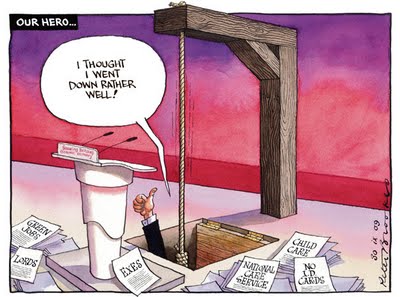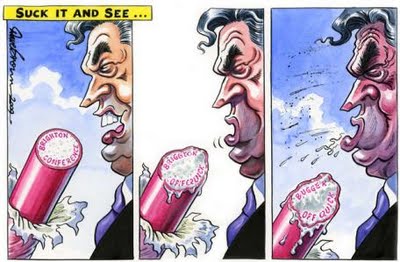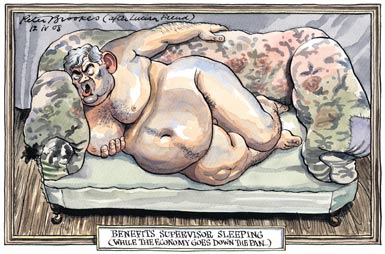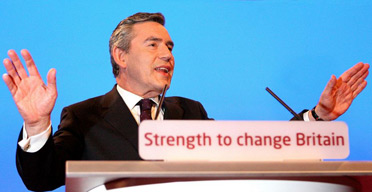 The great betrayal has taken place. This was a shaming day for democracy, an act of cowardice on behalf of Gordon Brown, an event that will change Britain forever, and our so-called elected representatives have denied the people their right to a vote on a matter of national importance.
The great betrayal has taken place. This was a shaming day for democracy, an act of cowardice on behalf of Gordon Brown, an event that will change Britain forever, and our so-called elected representatives have denied the people their right to a vote on a matter of national importance.
Or so some would have us believe. The whole argument about a referendum on the European Union's Lisbon treaty has been a sham, documented by ignorance and deception on all sides, with every political party outside say UKIP being far from honest about their real motives for supporting the position they adopted. The real sad thing is that such casual contempt for the average person trying to make head or tail of just what the reforming treaty does, is meant to do or whether it should be supported or not is nothing out of the ordinary in this country, a supposed parliamentary democracy which is trying to build a knowledge economy, laughable as it. It isn't however just parliamentarians that have been the key deceivers; if anything, far from it. By far the most nonsense written about the constitution and what it will supposedly do appeared in the right-wing tabloids, as per usual, with ridiculous claims that we'll lose our seat at the UN, that it provides a "blueprint" for a "United States of Europe", with centuries of parliamentary democracy consigned to history. Yep, that's right. According to certain sections of the press, MPs just voted for their own abolition.
Even I'm directly not being straight with you, and I'm also certainly biased. In order to even begin to write about or discuss the treaty properly, you need to read it, and I haven't, nor do I have any intention of doing so. I'm certainly in the majority though; something like 99.99% of the rest of the British population haven't read it either. Those that do can't even begin to understand it: even the BBC's Europe editor Mark Mardell has said that he can't even begin to work out what it means from beginning to end. It's probably indecipherable even to those who drew it up, and who knows, maybe it's even intentional. Regardless of that, it's the treaty that would be put before us, and the time to have made it legible, simple to understand or for an exact, easy list of exactly what it will do and what it won't do has passed. We instead have to rely on everyone other than ourselves to tell us what's in it, yet they haven't done even the slightest work to do so either. According to numerous politicians, newspapers and thinktanks the treaty is roughly 90% the same as the previous constitution, but can we actually rely on any of those to have read it and understood it themselves? And was the previous constitution, itself unreadable, so thoroughly bad, despite its rejection by the French and the Dutch for reasons which weren't necessarily all to do with what that contained either?
As said, I haven't read either, but one of the few facts I am certain of is that there are two main important differences between the constitution and the treaty, and one also which affects us personally vis-a-vis the treaty. Firstly, that the treaty, unlike the constitution, is not legally binding, and secondly that the treaty provides one important detail that wasn't present in the constitution. To what you would expect would be the delight of some in the Conservatives and certainly UKIP, it provides a precise and exact mechanism for leaving the EU, something that is currently completely lacking in any of the treaties that the Lisbon treaty is meant to bring together and reaffirm. Lastly, what would be the biggest benefit of the treaty, the charter of fundamental rights, an extension to the ECHR, was one of the government's red lines, mainly because of the sections on "solidarity" which so offend the business "community" and would ride a coach and horses through the restrictions on trade unions we've had since Thatcher's days.
Update: Rather embarrassingly, as Ken points out in the comments, both the constitution and the treaty contained the secession clause. I apologise for making an honest mistake. It's still the first time that the EU has offered an exact mechanism for leaving the union, and one which is both important and deserves supporting.
The biggest mistake was undeniably Labour offering a referendum in the first place. Despite what some have constantly alluded to, Gordon Brown did not personally ever offer a referendum on the constitution, let alone the Lisbon treaty. As with most other things involving Tony Blair, his decision to have a referendum was a sop to Rupert Murdoch, with it being widely rumoured that Murdoch offered Blair an ultimatum: either you hold a referendum on the constitution, or the Sun and the Times would support the Conservatives in the then fast approaching 2005 general election. Blair hastily agreed, and although he might not have envisaged that he would have been swept out so quickly after his third election win, he was also reasonably safe in the knowledge at the time that it was likely the French would reject the constitution and so negate the need to hold one anyway. With the Conservatives already offering a referendum, again without much chance of actually taking power and needing to hold one, something which would have exposed the party's continuing splits over Europe and left it without the slightest idea what to do, and the Liberal Democrats therefore the odd ones out, they had a little option but to declare they too would have one, even though they again had about as much chance of gaining power as Amy Winehouse has of being left alone by the paparazzi.
This brought us to the situation today, where all the parties are accused of betraying their manifesto promises and therefore misleading the people and treating the public with contempt. This is again of course, a nonsense. No one again seriously expects the voters to actually read each parties' manifesto; that would probably be an act of individual thinking that would deeply offend against the average politician and journalist, and also lead half of those seriously thinking of voting to not bother after the realise how little difference there is between all of them. It's also not as if this is the first time that Labour has directly broken a manifesto promise: there are so many they've either not bothered with or half-heartedly attempted to make up an entire post on its own. 1997's promised electoral reform; they've repeatedly promised to reform the House of Lords; and in 2001's they directly promised not to introduce student top-up fees, so they did the exact opposite.
As stated at the beginning, not a single one of our magnificent parties are being honest with us for their reasons for either changing their minds or sticking with them. The Sun is right in saying Brown won't have a one because he knows he'd lose, but Labour also doesn't want one because besides all the talk of re-engaging and devolution, the party is also still monolithic and a firm believer in the superiority of parliament, rather than in asking the people every five seconds what they want in a plebiscite. The Conservatives are for the most part in favour of a referendum because it means they tap further into popular discontent; it doesn't matter that the party itself has no intention of getting out of Europe altogether, which is what those most in favour of a referendum truly want, including a good proportion of its backbenchers. Not even Cameron's that silly, regardless of his petty decision to move out of the European parliament's main grouping of conservative parties, itself a sop to the headbangers within the ranks. Despite all the opprobrium directed towards them, the Liberal Democrats have actually been the most honest with both themselves and the public. Rather than wanting a referendum on the treaty, which is in reality just a front for one on the EU itself, they've come out and said let's have this debate in full about whether we should stay in or not. This removes all the charades, nonsense and deception surrounding the treaty and asks the adult question: is staying in the EU good for us or not? As they have also argued, this would also be the first time that anyone under 50 had been directly asked for their input on the European Union, since the vote on staying in the EEC back in 1975. Yes, it's true that this is also partly a response to the fear of a referendum on the treaty being lost and that this would be one that would be more winnable, but the consequences of either referendum being lost would be broadly similar.
A no vote here on the treaty would be entirely different to both the French and the Dutch no votes were back in 2005. They were decisive in killing off the treaty precisely because both countries had long been at the centre of the EU and instrumental in its initial conception, as well as both broadly pro-further integration. It's because of our long recalcitrant attitude towards the EU that such a vote resulting in a no would be dismissed in such an easy fashion; rather than being Europe's problem, it would be our problem. Whatever the feelings we should have about that, it's long been established that it's better to be inside the tent pissing out than it is be outside the tent pissing in. Without attempting to reform Europe our way, and by being as strong as possible in attempting to influence the organisation, influence which only comes through respect, we might as well give up entirely and go our separate way. For anyone who believes in small things like the Human Rights Act, which although not connected with the EU would never have happened if it were not for our membership, that's a bitter pill to swallow.
If all this sounds like an argument against a referendum on the treaty, it isn't one. I actually think we should have had and should have one, mainly because despite the politicians, I think it could still be won. We routinely underestimate pro-EU feeling, and also overestimate the influence of the tabloids' incessant propaganda over the institution. It would certainly be easier to win one on continued membership, and that would be a far better question to ask the country to decide upon, but the treaty itself, for all its faults, is to streamline the EU, reform it appropriately for its current expansion and possible further expansion, and also institutes rights which we have long been denied in this country. That was the argument that should have been taken to the country, but the politicians were too pusillanimous to even try and risk the wrath of the Murdoch press, the Telegraph and the Mail. I certainly won't however be losing any sleep over not having one, nor is it a disaster for the country or a betrayal. A far better use of a referendum would be to have one on electoral reform, one that was promised back in 1997, with ironically the elections for the European parliament, which are on proportional representation, being the fairest that are conducted in England, if not in Wales or Scotland which do use a form of PR. Instead, the whole debacle has just been the continuation of the usual biases and manoeuvres which politicians have always used and will always use. It has been ever thus, and will be ever thus, and no amount of huffing and puffing from the press, threats from the Sun to hold Brown to account for it or not will change that.
Related post:
Nosemonkey - Cameron, the Tories’ confusing EU politics, and a chance for reformLabels: Conservatives, EU "constitution", EU treaty referendum, European Union, Gordon Brown, ignorance, Labour, Liberal Democrats, Lisbon treaty, politics









